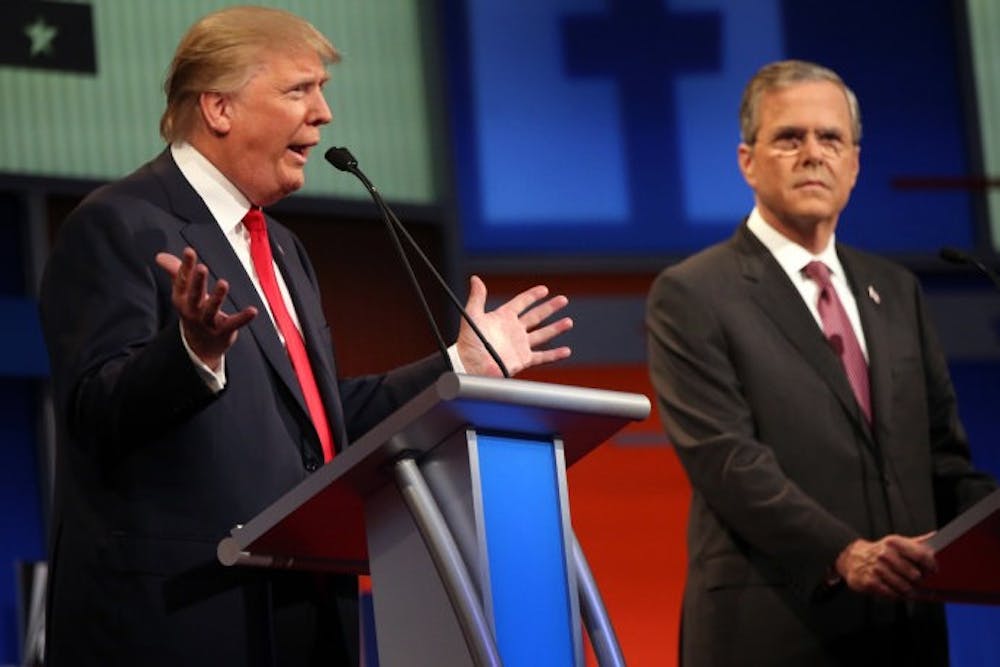With another Republican debate airing tonight on Fox Business at 9 p.m. and the 2016 election fast approaching, it’s time to take a closer look at the top presidential candidates’ platforms on college tuition and loans.
Which politicians support free college tuition? Which have actual plans for lowering the cost of loans? Here is The Daily Pennsylvanian’s lowdown on the eight major candidates’ views on higher education.
REPUBLICANS:
Donald Trump
Infamous 1968 Wharton graduate Donald Trump does not have a specific plan for college tuition. However, in an August interview with The Hill, Trump remarked that federal student loans are one of the “only things the government shouldn’t make money off.”
In 2005, Trump tried to create a for-profit online college called Trump University, according to Think Progress. Trump University changed its name to The Trump Entrepreneur Initiative after legal issues about its legitimacy arose (it had no college accreditation and did not offer degrees). The state of New York is currently suing Trump for misrepresentation regarding his online courses.
Ben Carson
While he has criticized Democrats’ tuition plans and suggested the Department of Education be used to monitor colleges for political propaganda, Carson does not have a specific college tuition plan.
According to his website, Carson wants to reduce college tuition costs through “the free market” and streamline the financial aid system. It remains to be seen exactly how the retired neurosurgeon plans to do this.
Carly Fiorina
Fiorina has no specific platform on college tuition. However, the former Hewlett-Packard CEO did speak a bit about student loans last November at Penn — mainly to criticize Sanders’ free college tuition plan as unrealistic and the federal student loan program as socialistic.
Last May, FactCheck.org, which is run by Penn’s Annenberg Public Policy Center, accused Fiorina of incorrectly characterizing the government’s “nationalization” of student loans as well as misstating the federal interest rate on loans.
Ted Cruz
Cruz has not said much about college tuition or student loans, other than to mention he recently paid off his reported $100,000 in college debt.
However, as a senator, he voted against several proposals to lower loan interest rates, according to Mic. He also wrote and presented an amendment in 2013 that cut federal grants for lower income students and made it harder to repay loans.
Marco Rubio
Compared to his fellow Republican candidates, Rubio has a markedly more detailed plan for tackling college debt. Amid calls to simplify the financial aid process and disseminate higher education information, Rubio wants to establish an income-based repayment plan for student loans.
IBR adjusts monthly payments according to the income of the borrower and allows payments to be made over a longer period of time. It is currently already an option for federal loans, but Rubio would presumably seek to make IBR the main and most-used method for paying back student loans.
Jeb Bush
Bush has no specific plan on college tuition or loans, despite promising one was forthcoming since last September.
He has emphasized his belief that students need to get through college and into the workplace faster in order to minimize the cost of higher education. He has also, quite liberally, voiced his support for two years of free community college, according to The Hill.
DEMOCRATS:
Hillary Clinton
Clinton proposed a college tuition plan in August to help students attend public college without taking out loans, as reported by the New York Times.
The plan has a price tag of $350 billion over 10 years, with half of that money going to individual states. Clinton plans to use increased taxes on the wealthy to fund the plan. In return for federal funding, states are expected to increase public spending on higher education and work to reduce rising tuition costs.
Experts predict it will be difficult to pass the tax increase portion of her plan in a Republican-dominated Congress, but bipartisan concern over college affordability may counteract this worry.
Bernie Sanders
One of the biggest highlights of Sanders’ campaign so far has been his radical college tuition plan. If elected, Sanders promises to make college tuition free for all students at public universities. Sanders’ plan calls for $750 billion over 10 years, more than twice the amount of Clinton’s plan, and the largest amount proposed by any presidential candidate. This will be funded by taxes on Wall Street transactions, bonds and derivatives.
Think tanks have warned that Sanders is over-projecting the amount of money he will be able to gain from his current proposed Wall Street taxes, according to CNN. Contrastingly, Sanders’ team says their reports are too conservative.
Correction: A previous version of this article stated that FactCheck.org is run by Penn's Annenberg School for Communication. The article has been updated to reflect that it is run by the Annenberg Public Policy Center. The DP regrets the error.









